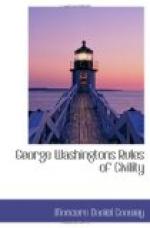This was Laurence Washington of Garsden, Wilts., who married Elianor. second daughter of Wm. Gyse; their only child, a daughter, having married Robert Shirley, Earl Ferrars. Laurence Washington died Jan. 17, 1662, and his widow married Sir William Pargiter.[1]
[Footnote 1: See “An Examination of the English Ancestry of George Washington. By Henry F. Waters, A.M., Boston. New England Historic Genealogical Society, 1889.”]
In a letter to the New York Nation (5th June 1890), I said: “Though my theory, that the Rev. James Marye taught Washington these ‘Rules,’ has done good service in leading to the discovery of their origin, it cannot be verified, unless the clergyman’s descendants have preserved papers in which they can be traced.” I have since learned from the family that no such papers exist. The discovery just mentioned, that a Part Second of Youth’s Behaviour was published in 1664, and dedicated to two ladies of the Washington family in England, lends force to Dr. Minor’s suggestion that Washington might have worked out his Rules from the Hawkins version. It would be natural that Part ii. so dedicated should be preserved in the Virginia family, and should be bound up with Part I., published the year before, as it is bound in the British Museum. It is certain that one of the later editions of the Hawkins version was used in the preparation of Washington’s “Rules,” for the eighteen Rules not in the French book are all from “Youth’s Behaviour” (1663). Moreover, the phraseology is sometimes the same, and one or two errors of translation follow the Hawkins version. E.g., Maxim ii. 16 begins: “Prenez garde de vous echauffer trop au jeu, & aux emportements qui s’y eleuet.” The second clause, a warning against being too much carried away by excitements of play, is rendered by Hawkins, “Contend not, nor speake louder than thou maist with moderation;” and in the Washington Ms., “affect not to Speak Louder than ordenary.”
A careful comparison, however, of Washington’s Rules with the Hawkins version renders it doubtful whether the Virginia boy used the work of the London boy. The differences are more than the resemblances. If in some cases the faults of the Washington version appear gratuitous, the printed copy being before him, on the other hand it often suggests a closer approach to the French—of which language Washington is known to have been totally ignorant. As to the faults, where Hawkins says ceremonies “are too troublesome,” Washington says they “is troublesome;” where the former translates correctly that one must not approach where “another readeth a letter,” Washington has “is writing a letter;” where he writes “infirmityes” Washington has “Infirmaties;” the printed “manful” becomes “manfull,” and “courtesy” “curtesie.” Among the variations which suggest a more intimate knowledge of French idioms than that of Hawkins the following may be mentioned. The first Maxim with




